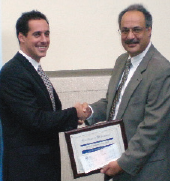Genetics and Aggressive Prostate Cancer
 (This article is technical in nature, but it shows how theoretical research, with support and focus, can quickly become helpful in clinical practice.)
(This article is technical in nature, but it shows how theoretical research, with support and focus, can quickly become helpful in clinical practice.)
Brian Helfand, MD received the Astellas Award for the best abstract on prostate cancer at 2008 American Urological Association meeting. Brian Helfand, MD, PhD, a urology resident at Northwestern working in Dr. Catalona’s research group, delivered a presentation for the recent American Urological (AUA) Association to answer the question:
Do the 3 significant 8q24 prostate cancer susceptibility regions predict aggressive disease?
For this work, Dr. Helfand won the Astellas prize for the best AUA abstract on prostate cancer for the AUA meeting in May, 2008.
(Quest covered the discoveries of these genetic regions in the last issue (Spring 2008) and the articles are on the URF website: www.drcatalona.com)
While previous genetic studies show a clear relationship between the genetic regions and the risk for prostate cancer, they did not address clinical applications for diagnosis or treatment.
Helfand explained that researchers don’t know how these genetic areas influence the development of cancer. What they do know is derived from several studies involving thousands of patients with prostate cancer and thousands of healthy volunteers.
“In all of these studies, the “variant” base pairs along chromosome 8 (in a region along the long arm, referred to as 8q24) are significantly more prevalent in patients with prostate cancer compared to control groups. These genetic variants are not located in any known gene, and thus their influence on prostate cancer development currently remains a mystery,” Helfand said.
Helfand’s study addressed potential practical applications from recent genetic findings in the 8q24 region..
His research was based upon 799 patients (Catalona) who underwent radical prostatectomy at Northwestern Memorial Hospital.
Helfand’s conclusions were as follows:
1. Risk variants from the 3 different 8q24 regions (referred to as Region 1, Region 2, and Region 3) are present in a significant number of patients (84%) with prostate cancer.
2. 8q24 risk variants from each of the 3 different regions confer increased adverse features
3. The effects of the risk variants appear to be cumulative (i.e. there is positive correlation between the number of risk variants and the likelihood of adverse features
4. 8q24 risk variants may provide additional prognostic information.
In particular, region 2 in carriers of the risk allele had greater biochemical recurrence.
Also, those with multiple risk alleles had greater adverse pathology: positive surgical margin, extracapsular tumor extension, seminal vesicle invasion, and in rare instances, lymph node metastases.
If Helfand’s work is replicated in other studies; men who carry risk alleles in these genetic regions could be recommended for early-age PSA testing, would be watched very carefully, would be candidates for immediate treatment and careful follow-up.











